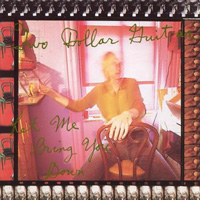 Two Dollar Guitar
Two Dollar Guitar
Let Me Bring You Down
by Ben Sisario
Scan to the end of Two Dollar Guitar‘s first album, Let Me Bring You Down, and you’ll hear something strange. Breaking through the band’s ghost-town ballad is the sound of an old talking Casper doll. A string squeaks, and Casper speaks. “Let’s play ghost!” he says. “I’m not afraid!” Tim Foljahn, singing slurry syllables and sounding barely alive, pulls Casper’s cord again and again. “Won’t you play with me? I’m not afraid!” In the album’s insert art Foljahn’s hunched figure blurs as he walks across a room filled with morbid religious art while Casper’s smiling plastic face stares straight at you, his arms outstretched, looking like he’s about to tell a great joke.
For a guy who can make a thirty-year-old Casper doll seem like a hell-beast, Tim Foljahn was remarkably friendly, sitting down with me for a long talk before a gig in Charlottesville, Virginia. More remarkable is that this extraordinary guitarist is almost completely unknown, considering his impressive alternative rock credentials. Besides making two albums with his current band, Two Dollar Guitar, Foljahn played in Half Japanese for two years, was in the brilliant but short-lived Mosquito with Jad Fair and Steve Shelley, has played guitar in the Boredoms, was Thurston Moore’s chosen backup man for his Psychic Hearts album, and now plays with Shelley in Chan Marshall’s Cat Power.
On tour in support of their second album, Burned and Buried, Two Dollar Guitar have hooked up with a few Dutch bands on a showcase tour for Brinkman Records. The night before, they played for a tiny crowd at a coffee house in Raleigh. “I think they might be getting pissed,” Foljahn says with a smirk, “because they mistakenly thought we’d draw people.”
Often likened to Leonard Cohen and Lee Hazlewood, Foljahn sings a perverse kind of country music, heavily introspective and gloomy, played in sparse arrangements for a three-piece rock band. Every member of Two Dollar Guitar has had a successful career as a sideman (Shelley in Sonic Youth, bassist Dave Motamed in Cell and Das Damen) and when the three come together no one musician dominates the sound; they watch each other closely, following cues and letting the sound swell and fade freely.
Onstage, the band has a hypnotic power. Foljahn’s dour persona becomes a focal point as creepy grooves sneak out, their sometimes dramatic developments sneaking up on you. Shelley’s metronomic beat and Foljahn’s beyond-the-grave delivery add to the trancelike sound. Before you know it, you’re swept up in the horrible narrative of “Blood on the Plow,” a song about the cornfield burial of a newborn child. “It was in the dead of winter when you began to show,” Foljahn sings, stiff as a scarecrow.
At a time when everybody seems to have a Palace Brother living on his block, it’s easy to write off Two Dollar Guitar as just another band of guys who used to play loud but have done the Evan Dando thing and traded in their Bigmuffs for acoustics and old-time pathos. After all, they certainly weren’t the first. What Two Dollar Guitar have going for them is not indie obscurantism but superior song writing and, more significantly, the ability to make country music as vivid and scary as it’s supposed to be. Foljahn’s songs are alive with fear and worry, the sounds of somebody who feels old beyond his years and fears death. The songs have the feel of a small, dark room, with chairs and tables, crusty walls and dusty old picture frames.
While Two Dollar Guitar is all focus and subtle gloom, Mosquito was a sprawling mess. Foljahn, Shelley, and the notorious Jad Fair lasted barely a year and a half together, but in that time managed to record three full-length albums and a slew of EPs, and still have stuff left in the vaults. Improvising in the studio, Foljahn and Shelley would lay down a groove in one room while Fair howled and shrieked next to the control board with his hands on a small arsenal of effects, frequently including a Toys-R-Us pitch-changing toy. “A big red dildo-looking thing,” Foljahn recalls, the pitch-changer totally absorbed Fair for months.
“We couldn’t always tell what Jad was doing,” he says of the i sessions. “He had delays of his own, and Fred Brockman [their producer] had his set of delays and gizmos that he used. He was sampling and running up and fading up and doing all kinds of shit. There was a lot going on.”
Mosquito brought three old friends together, its genesis a piece of Half Japanese lore. “I went to a show in Philly with Steve, where he and Jad were going to do some kind of duo,” explains Foljahn. “I was going to play maybe one song with them. Then I soundchecked with them, and Jad said to just play the whole show. I didn’t know any of the songs, but Jad was like, ‘It doesn’t matter if you don’t play these songs as long as you play a song.'” Before long they were blasting noise out of pitch-shifting dildo toys to crowds at Lollapalooza ’93.
In typical Jad Fair fashion, Mosquito fell apart after a time, leaving a discography scattered across half a dozen record labels worldwide. All three members had been living in Hoboken, New Jersey, but then Jad took off and got yet another incarnation of Half Japanese on the road again. Left in Hoboken, Foljahn and Shelley were able to focus on Two Dollar Guitar, spending time developing the songs for Burned and Buried. Seasoned sidemen, Foljahn, Shelley and Motamed all worked on their own parts with one eye on the other guys, and what came out is damn good. “That’s what I like about playing with other people,” Foljahn says. “You don’t have to worry about telling them what to do. If they’re good, they’ll do this great stuff that you’d never even expect.”

